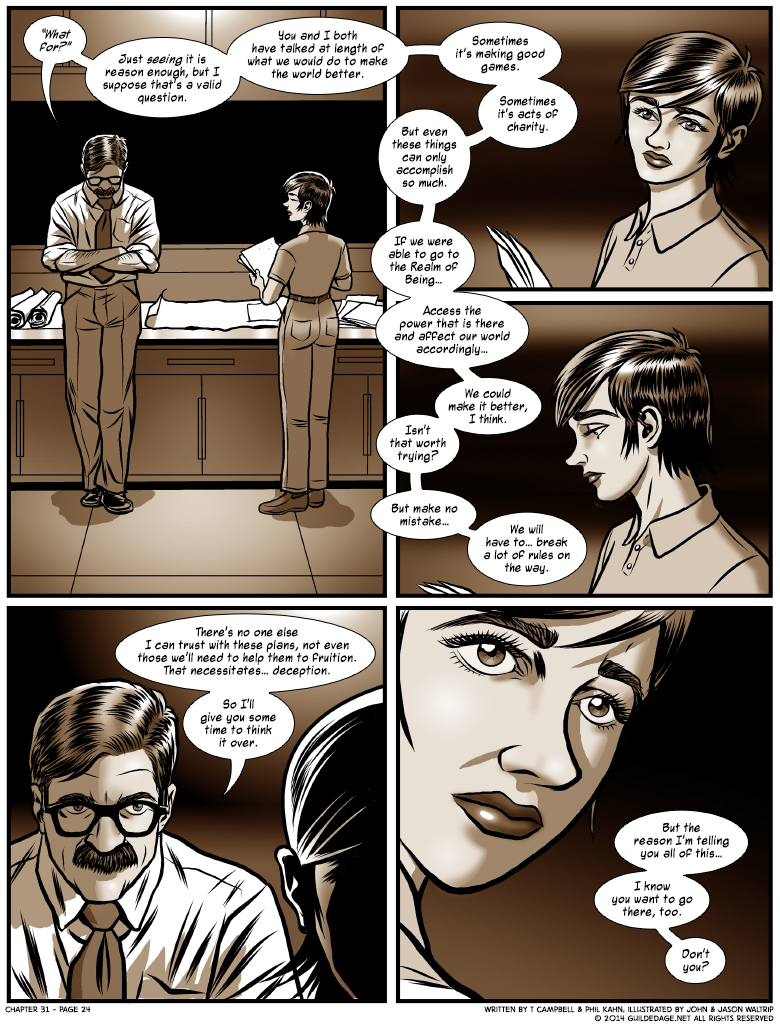Annotated 31-24
 This is as close to an origin story as Carol gets. There are other decisions along the path that calcify her destiny: choosing to work for Hurricane, choosing to cover for HR’s murder of Ferris, choosing to bring in JJ Berten. But this choice is what made HR and his product into her whole world.
This is as close to an origin story as Carol gets. There are other decisions along the path that calcify her destiny: choosing to work for Hurricane, choosing to cover for HR’s murder of Ferris, choosing to bring in JJ Berten. But this choice is what made HR and his product into her whole world.
She wouldn’t have had the easiest time refusing, mind you. CEO/founders whom shareholders consider visionaries have a lot of latitude with subordinates (see the accounts of Joss Whedon as a boss emerging recently). HR could dismiss her, sharply curtailing her other prospects, if he decided things were “just not working out.”
But she’s still young and pure enough not to focus on that, and she thinks too well of HR to treat it as a serious possibility. It’s more important that he’s already felt her out and knows she seeks self-actualization in her work. She needs to feel like her job is a cause, and he can very much work with that: in his own way, he believes that to be true. She may not yet know the details of this plan… she may have some inkling of the magick he can do, or she may think that this is just a revolutionary leap forward in VR interfacing and the “Realm of Being” is more of a guiding philosophy than a physical place one can go. But regardless, she needs to believe. Ultimately what pushes her to join in is not any insidious boss-employee inequality, but the weight of her own idealism.











While the page is meant to show us when Carol became invested in HRs… ‘plan’ (and it does at that) I also became invested and started asking ‘just what the hell is HR’s end game?’
From how I read it, it seems like the end goal for HR is to more or less become God. Though he probably wouldn’t phrase it as such(yet) and may frame his goals as “making the world a better place”(as vague as that is), the actual goal is to go to the fundamental source of existence and be able to manipulate it which sounds pretty god like
That becomes very apparent as the story goes on but how does one go from Plato to God Mode? How do you go from The Republic to Xeroxing another universe? How does that allow you to start controlling this one? Could someone else try this? Has someone else try this? I know few others cared about the ‘how?’ when it comes to HR but that’s the one question I always had.
This wasn’t an aspect upon which Flo and I cared to dwell; it just felt too distracting from where we wanted to pull focus. Someone else in the comments recently mentioned the Dark Ages, a period where certain books were repositories of knowledge almost lost to time, and a lot of modern ideas about magick tend to focus on the modern version of that idea. “Why, anyone with sufficient training could create a homunculus, but most people just don’t know that such knowledge is contained in Vittorius’ Applied Metaphysics, assuming they know enough Dutch or Afrikaans to translate the only extant edition. Don’t confuse it with the same title by the author Victorius; common mistake. Now, to animate your homunculus, you’ll need the writings of the half-mad monk Joseph XIII, as photographed from his lavatory wall in Mozambique…”
In our imaginings, such privileged knowledge overlaps strongly with executive privilege: HR’s part of a subclass of uber-rich who could pay the exorbitant prices that the keepers of such volumes would charge (or pay to get them by… other means). And he’s the only one in that small group who’s investing in magickal books instead of something like Bezos and Musk’s space race.
Have others tried something like this? Probably. But no one’s tried exactly this before because immersive MMORPGs are too recent a phenomenon to have combined with magick more than a few years prior to this story’s publication date, and no one until HR was wealthy enough and motivated to put all the other pieces together.
Interesting. I was kind of expecting that the book (since he seemed to have just one) was something that had resulted from his own efforts. An artifact from another dimension or a boon from the Countless, maybe. A basis for him to experiment and learn from. The idea that he just paid a lot of money for it is disappointing. This might be part of why I seem to have read him so differently than you were apparently trying to write him.
I think what he is essentially saying (and fits how things go) is, “But the reason I am telling you all this is because, though you are only sipping now, you’re still drinking the Kool-Aid already, aren’t you?
Road trip!
Idealism can be a good thing, if it’s rooted in good things, but many people, organizations, and movements often capitalize on such idealism to justify their own motives, movements, and goals. Used to justify political violence, continuous military conflict, and restrictions on “acceptable speach.” To say, in essence: “Look at this problem, isn’t it terrible? Give *me* more power and I’ll make it go away.” And some will give them that “power”… all the while forgetting that they are human, and thus just as flawed, ignorant, capable, and worthy as themselves.
And sometimes, like with the story of HR, the one asking for power forgets that they are human, and proclaim themselves above God, or to be God.
Sadly not a story limited to only comics and silly stories.
About HR, I’m curious if he’s actually saying to Carol what he thinks, or is he just giving her a more palatable sales pitch. Because I think a guy so invested in philosophy should realize that achieving godhood and obtaining ultimate power are not the same thing. A mortal man with mortal wants and needs is not a god, regardless of how much power he has. If he really wants to obtain otherwordly power to do good on this world, he should obtain otherworldy intelligence and wisdom, too. Otherwise, he will be stumped by the same old philosophical conundrums (i.e. “what is ‘good’ and what is ‘evil'”) Also, even if a mortal man has all the answers and the means to implement them, he’s a mortal man. He will die at some point, along with his ideals and plans. Sure, particularly good plans and ideals might outlive him, but only for a while. This imperfect world needs constant fixing, and only an immortal could achieve that. So, if HR is being honest here, he’s talking about becoming a god, or he’s inadvertedly confessing he’s way over his head on this.
As for Carol, I can understand being fascinated by someone’s knowledge or ideology. I was impressed when a teacher in college explained in class the concept of Orphism. He was elocuent and he made the subject fascinating. But if he had sincerely told me “so, do you want to descent to Hades with me?”, that would have given me pause. I get that Carol might be trying to rationalize what HR said to her “this is just some sort of philosophical gideline… right?” but the schematics HR put on the table quickly put that theory to rest. So, does Carol believe in magic or the supernatural?
In this scene, I’d classify her as “willing to extend the benefit of the doubt.” HR’s a demonstrable genius, after all, and the parts that don’t quite seem to make sense will surely reveal themselves as she gets closer to them.
Maybe this is the Boomer in me talking, but “executive at a large video game company” is nowhere near the top ten careers I would choose if I was an idealist who wanted to “make the world a better place.”
I don’t mean to dig at creative types. Follow your passions, support the arts, and all that (though even then, it’s not like Carol is working in a remotely art-connected position), but at the same time it’s not like the next WoW is going to cure cancer. I get that a central conceit of this story is that there’s a virtual, “video game” world running parallel to our own in Arkerra, but I think HR and Carol as character archetypes working at Hurricane is a place where I kinda had to turn my brain off and ignore the incongruity to enjoy the rest of the narrative.
My issue is that A) there are better, more plausible places (like, actual labs where actual science is done) for ethics-lacking mad scientist and his starry-eyed, enabling, idealist follower to thrive in and B) Mad scientists and starry-eyed idealists make REALLY bad three-letter officers in a career where there’s absolutely no shortage of competitors looking to take their jobs at the multi-billion-dollar video game behemoth.
I think you’re not wrong that HR and Carol are outliers in some respects, but the larger tech sector has seen a whole lot of folks in the last thirty years convinced that their devices, however trivial-seeming, would save the world or at least change it for the better. Facebook’s stated goal was essentially to promote empathy, and look how that worked out. Less cynically, there has been a big push in game design to create feedbacks that reward more positive behavior, from altruism to physical exercise.
There is an upcoming scene where Carol assesses that Hurricane’s rivals have started to notice its lack of leadership and have begun to circle it like sharks. There was an earlier scene where at least one employee felt like HR was obviously losing his grip. I think it’s safe to say that such concerns meant that HR wasn’t exactly the God of Management.
That said, what makes it easier for me to believe in HR is the worship that we seem to aim at CEOs, founders, and especially CEO-founders of big, successful corporations. HR is the auteur-creator of a game that’s raking in billions, and even if his management skills don’t seem to equal his technical ones, that buys him a lot of rope. If Steve Jobs, at the height of his power and influence, had said “Yeah I’ve got a secret project in the basement, can’t tell you much about it, but I think it’ll be big,” he probably would’ve had investors throw a couple billion at him just to get a stake in whatever it was.